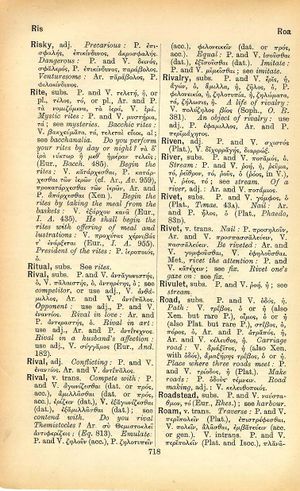rival: Difference between revisions
mNo edit summary |
(3) |
||
| Line 18: | Line 18: | ||
<b class="b2">Equal</b>: P. and V. ἰσοῦσθαι (dat.), ἐξισοῦσθαι (dat.). | <b class="b2">Equal</b>: P. and V. ἰσοῦσθαι (dat.), ἐξισοῦσθαι (dat.). | ||
<b class="b2">Imitate</b>: P. and V. μιμεῖσθαι; see [[imitate]]. | <b class="b2">Imitate</b>: P. and V. μιμεῖσθαι; see [[imitate]]. | ||
}} | |||
{{esel | |||
|sltx=[[ἐνστάτης]], [[ἀνταγωνιστής]], [[ἀντίπαλος]], [[ἁμιλλητήρ]], [[ἀντίταγμα]], [[ἄνταθλος]], [[ἀπέλλητος]], [[ἀντίφαρις]], [[ἀνθάμιλλος]], [[ἀντεραστής]], [[ἀντίτεχνος]] | |||
}} | }} | ||
Revision as of 07:20, 22 August 2017
English > Greek (Woodhouse)
subs.
P. and V. ἀνταγωνιστής, ὁ, V. παλαιστής, ὁ, ἀντηρέτης, ὁ; see competitor, or use adj., V. ἀνθάμιλλος, Ar. and V. ἀντίπαλος. Opponent: use adj., P. and V. ἐναντίος. Rival in love: Ar. and P. ἀντεραστής, ὁ. Rival in art: use adj., Ar. and P. ἀντίτεχνος. Rival in a husband's affection: use adj., V. σύγγαμος (Eur., And. 182).
adj.
Conflicting: P. and V. ἐναντίος. Ar. and V. ἀντίπαλος.
v. trans.
Compete with: P. and V. ἀγωνίζεσθαι (dat. or πρός, acc.), ἁμιλλᾶσθαι (dat. or πρός, acc.), ἐρίζειν (dat.), V. ἐξαγωνίζεσθαι (dat.), ἐξαμιλλᾶσθαι (dat.); see contend with. Do you rival Themistocles? Ar. σὺ Θεμιστοκλεῖ ἀντιφερίζεις; (Eq. 813). Emulate: P. and V. ζηλοῦν (acc.), P. ζηλοτυπεῖν (acc.), φιλονεικεῖν (dat. or πρός, acc.). Equal: P. and V. ἰσοῦσθαι (dat.), ἐξισοῦσθαι (dat.). Imitate: P. and V. μιμεῖσθαι; see imitate.
Spanish > Greek
ἐνστάτης, ἀνταγωνιστής, ἀντίπαλος, ἁμιλλητήρ, ἀντίταγμα, ἄνταθλος, ἀπέλλητος, ἀντίφαρις, ἀνθάμιλλος, ἀντεραστής, ἀντίτεχνος

